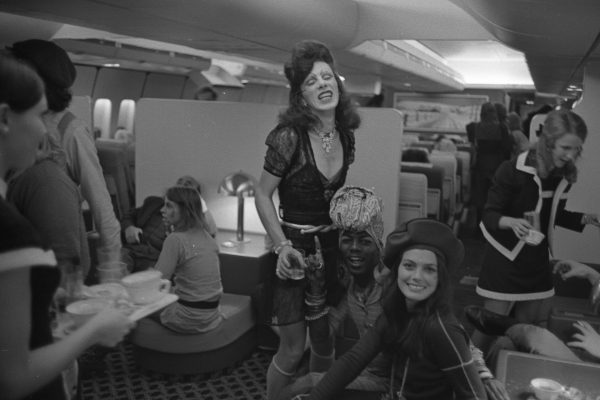Original Publication: Newsweek – May 10, 1976
The eternal flame at John F. Kennedy’s grave in Arlington National Cemetery shone directly onto the lens of the movie camera. Never before had the Kennedy family allowed the site to be filmed for a commercial movie, but last week they granted that permission to the lone, blue-jeaned figure who was standing in camera range halfway up the hill behind the grave. Looking fiercely pious, he put on his big black Navajo hat, “Oh, my God,” gasped a teenage tourist who had wandered onto the “set.” “It’s Billy Jack!”
Billy Jack, the ex-Green Beret, Indian avenger who uses barefoot karate chops to preach peace and love the way John Wayne used six-shooters, has swept out of the Southwest to reform the entire Federal government in Washington. In 1939, Frank Capra directed “Mr. Smith Goes to Washington,” starring James Stewart as an idealistic, aw-shucks political neophyte who takes on the Senate establishment and wins. In 1976 Tom Laughlin is directing himself in “Bill Jack Goes to Washington.” As Sen. Billy Jack, he prevents the corporate take-over of America and presents youth everywhere with a plan on how to gain political power by organizing their own neighborhoods.
Messianic: The $5.5 million project seems tailor-made for the controversial Tom Laughlin, 44, who outbid pop idol John Denver for the rights to update “Mr. Smith” “It’s a shame,” laments Laughlin “that the youth of our country have only two heroes – Ralph Nader and a character named Billy Jack.” Laughlin is the Jimmy Carter of the movie business. A driven man and a messianic marketing genius, he defied the old pols of Hollywood with unorthodox distribution methods and super-sell media campaigns that parlayed his first two “Billy Jack” epics, “Bill Jack” and “The Trial of Billy Jack,” into two of the biggest successes in recent years. His underdog hero touched a genuine never among youth and has, he says, brought in estimated gross earnings of more than $100 million. Laughlin, who plows his profits back into new projects, also has six non-“Billy Jack” films in the works.
But Laughlin, who with his wife, Delores Taylor, is star, scriptwriter and distributor of the “Billy Jacks,” likes to think of himself as an underdog. People who have worked with him have accused him of being a terribly tyrant on and off the set. Film critics have damned his movies for simplistic sloganeering and excessive violence (one critic dubbed him “the Jack Webb of the left”). “I’ve been called everything from a rapist to a transvestite,” say Laughlin. “I’m happy if the straights think I’m a hippy and the hippies think I’M straight. That way I can be a bridge.”
Yet Laughlin is genuinely hurt that the press and his peers don’t credit him with cinematic artistry. “Anybody who really is good and tapping into the deeper level of the collective psyche” he says, “is almost never appreciated in his lifetime or ever.” He also resents being confused with his hero. “A part of Billy Jack lives in me, as do other characters, but it’s a terrible curse people project on you, thinking you’re a fictional character. People don’t even mention me as a movie star, and Delores and I are the most bankable people around.”
For Billy Jack’s invocation of the nation’s Capital, Laughlin has built a $750,000 replica of the Senate chamber in Hollywood, and this spring he and Taylor spent three weeks in Washington to research the movie. They hired Frank Mankiewicz, ex-aid to Bobby Kennedy and George McGovern, as political consultant and liaison man with the likes of the Kennedys (Mankiewicz recently resigned to run for Congress). They had breakfasts and dinners with Ralph Nader to discuss reform issues, and Laughlin trooped around Capitol Hill with some of Nader’s raiders, disguised as a lobbyist. One day, he was recognized in the House visitor’s gallery and his presence caused such a commotion that he was asked to leave. A few minutes later, in the House Cloakroom, he was besieged by Congressional Pages asking for autographs and Congressmen offering advice. “They all wanted me to take off my shoes and socks and do karate on the floor of the Senate,” says Laughlin – but he vows that Billy Jack will not expose his bare toes to the senators.
Betrayed: To ally himself closely with his legendary predecessor, Laughlin has hired Frank Capra Jr. as producer. He also offered Claude Rains’s original role as a corrupt, older senator to Jimmy Stewart, who turned him down (“He hated the idea,” says Laughlin). He cast 24-year-old Lucie Arnaz, the daughter of Desi Arnaz and Lucille Ball (who is a big fan of Billy Jack) in Jean Arthur’s role as the hero’s seasoned secretary. Her character is being altered to allow Laughlin’s wife, Delores, and their teenage daughter, Teresa, to continue performances from previous “Billy Jack” films. “At first I’m upset in the movie,” says Arnaz, “because I have to slow down my career to baby-sit this Indian.” But after her husband is betrayed by Deep Throat (borrowed from “All the President’s Men”) and murdered in the amphitheater behind the Tomb of the Unknown Soldier, she comes around.
“I’m trying, with emotions, to get people to re-evaluate things,” say Laughlin, adding that one of his future screenplays concerns a priest who rehabilitates battered children – “a ‘Going My Way’ with balls.” Laughlin is also a firm believer in the conspiracy theory of history. When informed last week that his permission to shoot a scene at one of Washington’s monuments had been suddenly revoked, he exclaimed: “See, see. That’s what this picture is all about. It’s just like Billy Jack says I the script: ‘Physical violence I can handle, but this kind violence, who do I touch?’” Well, Billy Jack could start by taking off his shoes and socks on the floor of the Senate.
This article is typed from the original material. Please excuse any errors that have escaped final proofreading.


